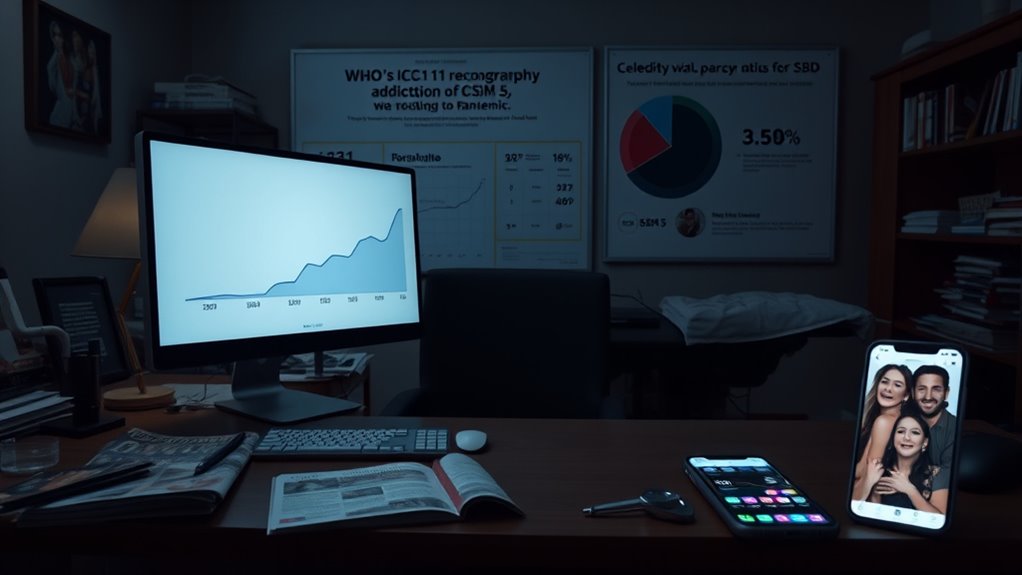Even Though the World Health Organization Now Recognizes “Compulsive Sexual Behavior Disorder” in Its ICD-11 (A Step Toward Legitimacy), the DSM-5 (Psychiatric Manual) Still Doesn’T List Sex Addiction, Causing Controversy Among Experts. This Debate Often Resurfaces When High-Profile Cheating Scandals Occur – Some Celebrities (From Tiger Woods to Various Actors) Blame Sex Addiction for Their Affairs, Prompting Public Skepticism. on the Research Front, New Studies (E.G., From University of Georgia) Have Linked Childhood Trauma to Higher Risk of Sex/Porn Addiction Later in Life, Suggesting Deeper Causes. in Current News, There’S Also Focus on How the Pandemic Impacted Porn and Sex Addiction Rates (With Many Rehab Centers Reporting Increased Cases). Meanwhile, Some U.S. States Have Gone so Far as to Declare Pornography a “Public Health Crisis,” Reflecting Societal Concern. on the Tech Side, the Rise of Affair Apps and Easy Online Hookups Has Blurred Lines Between Opportunistic Cheating and Genuine Compulsive Behavior. the Titles Below Are Timely, Newsy Takes on These Issues, Aimed to Inform and Spark Thoughtful Dialogue
Despite WHO recognizing “Compulsive Sexual Behavior Disorder” in ICD-11, the DSM-5 doesn’t list sex addiction, sparking ongoing controversy. High-profile scandals often bring this debate to the forefront, with some celebrities citing sex addiction for their affairs, prompting skepticism. Research links childhood trauma to higher risks later in life, and recent pandemic surges, along with societal moves like declaring pornography a “public health crisis,” add complexity. Tech advances blur lines between impulsive cheating and addiction—explore more to understand this evolving debate.
Key Takeaways
- WHO’s inclusion of “Compulsive Sexual Behavior Disorder” in ICD-11 signifies official recognition, unlike DSM-5, which still omits it, fueling controversy.
- High-profile scandals often attribute affairs to sex addiction, prompting public skepticism and debate over its legitimacy.
- Research links childhood trauma to increased risk of later sex or porn addiction, suggesting deeper psychological causes.
- The COVID-19 pandemic led to a surge in sex and porn addiction cases, with some states declaring pornography a “public health crisis.”
- Technology, including affair apps and online hookups, blurs the line between opportunistic cheating and genuine compulsive sexual behavior.

The debate over sex addiction has sparked intense controversy within medical, psychological, and societal circles. While some experts see it as a genuine disorder requiring treatment, others argue it lacks enough scientific basis to be classified officially. Recently, the World Health Organization recognized “Compulsive Sexual Behavior Disorder” in its ICD-11, marking a significant step toward legitimacy. This inclusion signals acknowledgment that some individuals struggle with uncontrollable sexual urges that disrupt their lives. However, the DSM-5, which is the main manual used in the United States, still doesn’t list sex addiction as a formal diagnosis. This discrepancy fuels ongoing debates among clinicians and researchers about whether sex addiction is a real condition or merely a variation of impulse control issues.
Whenever high-profile cheating scandals hit the headlines, the controversy heats up again. Celebrities like Tiger Woods and various actors have publicly blamed sex addiction for their affairs, prompting both media scrutiny and public skepticism. Many people question whether these claims are genuine or used as excuses. The skepticism intensifies when experts point out that some behaviors associated with sex addiction—like frequent infidelity or compulsive pornography use—may also stem from other underlying issues, such as emotional distress or relationship problems. Yet, for those who believe in its legitimacy, sex addiction is often seen as a complex interplay of biological, psychological, and social factors.
High-profile scandals fuel debate over whether sex addiction is genuine or an excuse.
Recent research from institutions like the University of Georgia has shed light on potential root causes. Studies link childhood trauma, neglect, or abuse to a higher risk of developing compulsive sexual behaviors later in life. These findings suggest that sex addiction might not be just about moral failing or lack of willpower, but rather a manifestation of deeper, unresolved psychological wounds. Meanwhile, the COVID-19 pandemic has brought new attention to the issue. As people faced increased isolation and stress, rehab centers reported a surge in cases related to pornography and compulsive sexual behaviors. Some states in the U.S. have even declared pornography a “public health crisis,” reflecting societal concern about its proliferation and impact.
On the technological front, the rise of affair apps and easy access to online hookups has blurred the line between opportunistic cheating and genuine compulsive behavior. The digital age makes it easier than ever to indulge in risky sexual activities, often without immediate consequences, which complicates diagnosis and treatment. As these issues continue to surface in the news and research, they spark ongoing conversations about how society should understand, address, and treat sex addiction. This debate is unlikely to settle soon, but it pushes us to consider deeper questions about human sexuality, mental health, and societal values.
Frequently Asked Questions
How Effective Are Current Treatments for Sex Addiction?
Current treatments for sex addiction can be quite effective when tailored to your needs, often combining therapy, medication, and support groups. Cognitive-behavioral therapy helps you identify triggers and develop healthier behaviors. Medications may reduce compulsive urges, and peer support offers ongoing accountability. While success varies, consistent treatment and a strong support system markedly improve your chances of managing the disorder and restoring balance in your life.
What Are the Legal Implications of Labeling Someone a Sex Addict?
When you label someone a sex addict, you may impact their legal rights, treatment options, and employment opportunities. You might face discrimination, increased stigma, or legal consequences such as custody disputes or involuntary treatment. You might also influence insurance coverage and legal defenses. Recognize that such labels carry weight—affecting personal freedoms, societal perceptions, and legal outcomes—so understanding the potential implications helps you navigate the complex legal landscape responsibly.
How Does Technology Influence the Development of Sex Addiction?
Technology considerably influences the development of sex addiction by providing easy, constant access to pornography, hookup apps, and online affairs. You might find yourself more vulnerable to compulsive behaviors due to these constant stimuli, making it harder to resist or control impulses. The anonymity and convenience online can reinforce addictive patterns, blurring the line between casual exploration and problematic dependence. Staying mindful of your tech use helps prevent this escalation.
Are There Cultural Differences in Recognizing Sex Addiction?
You might notice that cultural differences shape how sex addiction is recognized and accepted. In some societies, open discussions and treatment are common, while others view it as shameful or moral failing. You could find that Western cultures tend to medicalize and debate it more openly, whereas more conservative regions may deny or stigmatize it. Recognizing these differences helps you understand why perceptions and responses vary worldwide.
What Role Does Genetics Play in Compulsive Sexual Behaviors?
While environment influences behavior, genetics also play a vital role in compulsive sexual behaviors. You might think of addiction as purely learned, but studies show a genetic component that predisposes some individuals to impulsivity and compulsivity. Just like certain health conditions, your DNA can make you more vulnerable to these behaviors, highlighting that both biology and environment intertwine, shaping how and why you develop these tendencies.
Conclusion
As you navigate this tangled web of desire and doubt, remember that even in this digital age, the debate echoes like a ghost from the Victorian era—when morality clashed with human nature. Whether society labels it a disorder or a moral failing, understanding runs deeper than headlines. So, stay curious and compassionate, because just like the alchemists of old, we’re still trying to turn this complex issue into clarity in our modern world.









